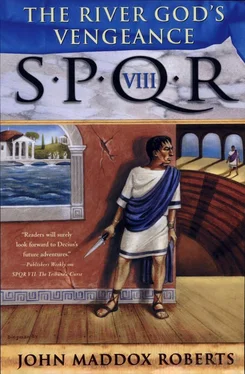John Roberts - The River God
Здесь есть возможность читать онлайн «John Roberts - The River God» весь текст электронной книги совершенно бесплатно (целиком полную версию без сокращений). В некоторых случаях можно слушать аудио, скачать через торрент в формате fb2 и присутствует краткое содержание. Год выпуска: 2004, ISBN: 2004, Издательство: St. Martin, Жанр: Исторический детектив, на английском языке. Описание произведения, (предисловие) а так же отзывы посетителей доступны на портале библиотеки ЛибКат.
- Название:The River God
- Автор:
- Издательство:St. Martin
- Жанр:
- Год:2004
- ISBN:9780312323196
- Рейтинг книги:4 / 5. Голосов: 1
-
Избранное:Добавить в избранное
- Отзывы:
-
Ваша оценка:
- 80
- 1
- 2
- 3
- 4
- 5
The River God: краткое содержание, описание и аннотация
Предлагаем к чтению аннотацию, описание, краткое содержание или предисловие (зависит от того, что написал сам автор книги «The River God»). Если вы не нашли необходимую информацию о книге — напишите в комментариях, мы постараемся отыскать её.
The River God — читать онлайн бесплатно полную книгу (весь текст) целиком
Ниже представлен текст книги, разбитый по страницам. Система сохранения места последней прочитанной страницы, позволяет с удобством читать онлайн бесплатно книгу «The River God», без необходимости каждый раз заново искать на чём Вы остановились. Поставьте закладку, и сможете в любой момент перейти на страницу, на которой закончили чтение.
Интервал:
Закладка:
“Excellent. Have these delivered to my house in the Subura. I shall need to peruse them at leisure.”
He looked at me as if a malicious god had just transformed me into a sheep. “You want me to allow state documents to leave the Tabularium?” Judging by his tone of voice, I might have asked him to break into the House of the Vestals and bugger all the virgins.
“Exactly. The Tabularium is not a temple or any other sacred place. It is state property dedicated to the storage of state documents. As an official of the State in pursuit of his duties, I require that these documents be taken to my home.”
He folded his arms and stared at me down his long, Graeco-Syrian nose, no small feat since I was far taller than he. “Not without the express order of a censor or one of the consuls.” There is nothing to match the hauteur of a state fiunky.
“The censors stepped down from office last year,” I said, “and the consuls have not yet taken office due to irregularities in the election of last year.”
“Well, then, you must simply do your perusing here.”
Behind him the state slaves grinned. One of them winked at me and made the universal hand sign for a transfer of funds.
I draped an arm over the freedman’s shoulder. “My friend, let us take a little walk and speak together.” We promenaded along the beautiful colonnade, where scholars and officials studied a multitude of state documents at the long tables, the southern exposure affording them the best possible reading light. As we walked, heads close together, we negotiated.
Luckily for me, the man did not want his bribe in the form of cash, of which I had little to spare; but he knew that I would be a praetor within a very few years, and there was a promotion he very much desired, which, in that office, I would be in a position to grant him. He likewise wanted to name the state slave to be manumitted and placed in his own present post. I knew that it was from that man he would receive his cash bribe, making his transaction with me more like a respectable exchange of favors. By the time we returned to the table, we had come to an agreement, and he directed some of the slaves under his charge to box up the documents and deliver them to my house.
This was a fairly straightforward transaction as such things were practiced at the time. A straight transfer of money was crass and vulgar, but a mutual exchange of favors was much esteemed. It was an unfair, inefficient, and corrupt system; but at least it worked, after a fashion. The First Citizen has spoiled it all by creating a bureaucracy made up of his own freedmen, handpicked by him and educated to their tasks, subject to periodic review and promoted or demoted accordingly. It is awesomely efficient and service is much improved, but the freedmen owe their loyalty only to him.
I prefer the old way.
4
We were walking back across the Forum when Festus caught up with me.
Now that the fighting was over, a couple of praetors had come out with their lictors to make arrests. A number of men lay about groaning, trying to crawl away, or just lying inert. I couldn’t tell if any particular gang had emerged victorious, but that really wasn’t the point. It is seldom possible to determine the winner in a brawl. The idea is to disrupt civic life and cow and terrorize the citizenry so that nobody dared stand for office against the gang leaders or the politicians they supported. The elections themselves were usually decided by bribery. I never said the Republic was perfect.
“Patron!” Festus shouted. Then, correcting himself, “I mean, Aedile!” He was an officious little man, son of one of our country stewards, come to the City and prospering as an oil merchant. He was one of the men I had sent to check on the troublesome drains.
“Yes, my friend?” I said, gesturing broadly. One of the rewards of clientage was being recognized publicly by a high official. Festus basked in the attention.
“Aedile, the state freedman Acilius wants you to come at once. He has something he says you must see.”
“He does, does he?” I had been looking forward to an hour or two at the baths, free of official worries. “This freedman summons a high official like a household slave?”
Festus smiled obsequiously. “He says it’s very important, sir.”
“Oh, well. What’s an aedile anyway? Just a glorified errand boy at everyone’s beck and call.” I went on in this fashion for some time. I did a lot of complaining that year. While I lamented the woes of the aedileship, we walked to the Forum access to the Cloaca Maxima, first and biggest of Rome’s sewers.
This access was covered with a shrine in the form of a miniature temple dedicated to Venus Cloacina, she who oversees the purity of Rome’s water. Inside this diminutive sanctuary, a steep staircase led down to the great drain. The distance was not far, for the tunnel lies just beneath the surface of the streets, angling downhill to the river. The stairwell was lined with tiny niches in which burned oil lamps. By the time we reached bottom, my eyes were almost accustomed to the dimness. The air was cold after the unseasonable warmth of the open air.
I was always uneasy intruding in this subterranean realm. There seemed something unnatural about this aqueous city beneath the City. It took an effort to maintain my air of official dignitas as we entered the small landing, its walls painted with ancient murals depicting half-forgotten gods and demons; snake-haired harpies with bulging eyes; long-nosed, donkey-eared, Etruscan death guides; and creatures that had no names in the whole vast nomenclature of Roman religion. Most prominent among them was the ferryman common to most religions, the one who takes the shades of the dead across the river Styx.
His near-double was waiting for us. Tied up to the miniature landing was a barge built like a small riverboat, painted black but decorated with the serpents, ox skulls, and red dogs traditionally associated with underground deities carved in low relief all around the sides, twined with painted myrtle and cornel shoots. Chained in the stern of the barge was an old slave whose white hair reached his elbows, bearded to the waist, clutching a long pole in hands like twisted claws. In the lamplight, his deep-shadowed eyes glittered like obsidian. In the subterranean gloom, he was as sure sighted as an owl, but he would have been struck blind by sunlight.
This ancient apparition was, naturally, known as Charon, and he had been a sewer bargeman since my father was a boy, condemned for some long-forgotten crime to ply the dark waters and never return to the surface.
“Welcome, Aedile,” said Acilius, who stood on the landing with a couple of his assistants. “If you will accompany me in the barge, I will show you a few things that demand your immediate attention.”
“Splendid,” I said, stepping into the craft and seating myself on one of its benches. “There’s nothing to liven up a fine afternoon like a boating expedition in a sewer.”
Actually, that stretch of the Cloaca Maxima was not at all objectionable, Many people never realize that the Forum was once a swamp, and the original cloaca was a simple canal dug to drain it. In time, the channel had been lined with stone to make it permanent; then it was roofed and paved over back when Rome had kings. Those old kings had built well; and after four hundred years, the stonework was as solid as ever, needing no upkeep at all.
“Roman engineering at its best!” I exclaimed, admiring the great, beautifully fitted tufa blocks overhead and to both sides. Here the water was relatively fresh, but that did not last long. Soon we came to the first of the public latrines situated directly over the sewer. Luckily for us, Charon, with his long pole, was adept at avoiding these conveniences, so we were spared being the targets of descending missiles. At intervals we passed lower arches, where smaller sewers contributed their outfiow to the greater stream.
Читать дальшеИнтервал:
Закладка:
Похожие книги на «The River God»
Представляем Вашему вниманию похожие книги на «The River God» списком для выбора. Мы отобрали схожую по названию и смыслу литературу в надежде предоставить читателям больше вариантов отыскать новые, интересные, ещё непрочитанные произведения.
Обсуждение, отзывы о книге «The River God» и просто собственные мнения читателей. Оставьте ваши комментарии, напишите, что Вы думаете о произведении, его смысле или главных героях. Укажите что конкретно понравилось, а что нет, и почему Вы так считаете.










